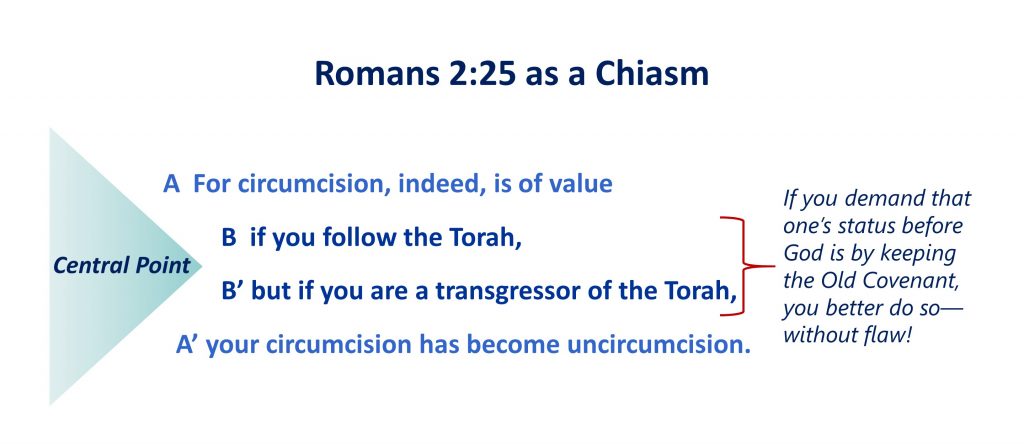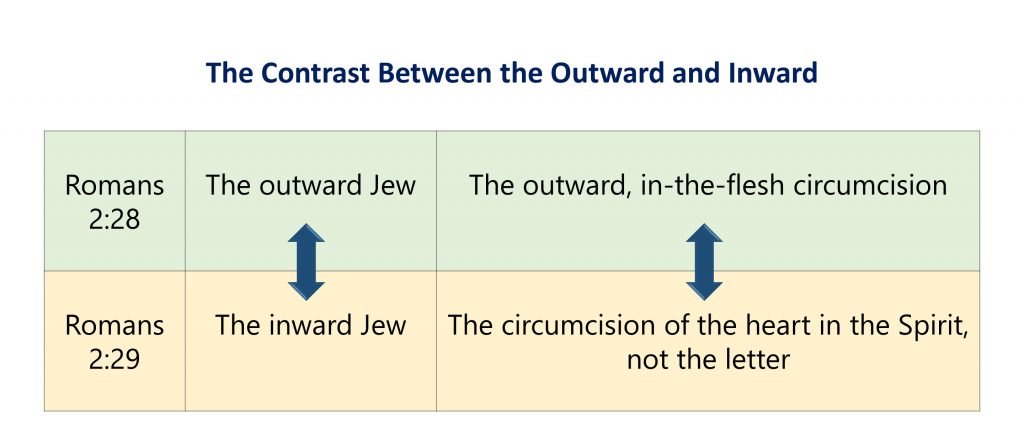 The overall culture in the church at Rome is one of division between the Jewish and Gentile Christians. The Jews want the Gentiles to follow the Old-Covenant rituals, as they do. The Gentiles saw this as no longer needed, being fulfilled by Christ. A resultant casualty of this rejection was also a rejection of the Law to censure someone. “If we’re saved by grace, then those Old-Covenant rituals and laws have no say in our lives.”
The overall culture in the church at Rome is one of division between the Jewish and Gentile Christians. The Jews want the Gentiles to follow the Old-Covenant rituals, as they do. The Gentiles saw this as no longer needed, being fulfilled by Christ. A resultant casualty of this rejection was also a rejection of the Law to censure someone. “If we’re saved by grace, then those Old-Covenant rituals and laws have no say in our lives.”
The Gentile Christians’ lives accused the Jewish Christians with the same Law they wanted the Gentiles to follow. Paul wrote, “…because of you, the name of God is blasphemed among the Gentiles.” The Gentiles Christians were proof of their failure. Paul then goes on to answer this possible question lingering in their minds: “We may not follow the Torah as we should, but at least we are circumcised!”
Excursus: Circumcision
Read Genesis 17:9-14
Leviticus 12:3: [The Lord told Moses,] “On the eighth day, the flesh of the baby’s foreskin must be circumcised.”
- What did circumcision show? (Genesis 17:11)
- What did not being circumcised mean in relation to God? (Genesis 17:13-14)
Circumcision was the sign God gave to make Abraham’s descendants into a royal dynasty: “My covenant in your flesh is to be an everlasting covenant” (Genesis 17:13). In the New Testament, Jesus was circumcised to show that He was a member of the people of God’s Covenant (see Luke 2:21).
Circumcision cut off part of a male’s flesh: his foreskin. (A woman had no true equivalent to circumcise, so they were still included in the covenant but were not circumcised). The circumcised flesh would die, no longer being part of the person. This symbolized that those who were not circumcised were, likewise, cut off from the people of God (Genesis 17:14).
Remembering Israel’s history, in 175 BC, the third of the Seleucid monarchs to control Judea, Antiochus IV, came to power. He wanted everyone in his kingdom to become Greek, not only in language but also in culture and religion. Part of this included forbidding circumcision. 1 Maccabees 1:60-61 reads: “In keeping with the decree, they [the Seleucids] put to death the women who had their children circumcised and the families who circumcised them and hung the infants from their mothers’ necks.”
It is hard for us to understand how embedded circumcision was in the Jewish mind. So, what the Jewish Christians were demanding of Gentile Christians should not surprise us—but they were still living in the Old Covenant.
Jesus Fulfills Circumcision in the New Covenant
Read Colossians 2:11-15
- How are we circumcised through a circumcision not done with human hands?
- In the same way that the foreskin died through circumcision, what dies in baptism?
- What does God make alive in baptism?
- How does He do this?
—————
The Jewish Failure to Follow the Torah
Read Romans 2:25
- In the beginning of this section, how does Paul meet the Jewish Christians where they are?
- What happens if one does not live out what the circumcision is meant to show?
“circumcision becomes uncircumcision”: The Greek nouns for “circumcision” (peritome) and “uncircumcision” (akrobustia) have two meanings. First, they described a man’s physical condition of having a foreskin or not. Second, they also referred to community groups. The “circumcised” was a term referring to the Jews; “uncircumcised” referred to the Gentiles. Paul is saying that the Jewish Christians’ failure to keep the Torah turned them into Gentiles! If the Jewish Christians demanded that one’s status before God was by observing the Old-Covenant, Paul forced them to confront that thinking.
Read Romans 2:26-27
- What is Paul’s implied answer to verse 26?
- If so, what is the conclusion?
- Were the Gentiles in the congregation at Rome, because they were following the Torah, in a place to judge the Jewish Christians?
- What’s the irony of Paul’s point for the Jew?
Read Romans 2:28-29
In this two verses, Paul contrasts outward and inward realities, how one may contradict the other.
Paul also “out-Jews” the Jewish Christians by referring to several Old-Testament passages from Jeremiah. Through them, Paul reveals the fallacy of their thinking. If they were real “Jews,” they also would have recognized the Old-Testament passages Paul was expecting them to know.
Jeremiah 31:33: “This is the covenant that I will make with the house of Israel after those days,” declares the Lord. “I will put my teaching [Law/Torah] within them and write it on their hearts. I will be their God, and they will be my people.”
Jeremiah 4:4: Masoretic Text: Circumcise yourselves to the Lord and remove the foreskin of your heart, men of Judah and residents of Jerusalem, or else or my wrath will flare up like fire and burn with no one to extinguish it because of your evil deeds.
Jeremiah 4:4: Septuagint: Circumcise yourselves to the Lord and circumcise the hardness of your heart…
- The irony of this passage is that circumcision is done to the man. So, even the reference to physical circumcision points to the circumcision of the heart. A hardened, unrepentant heart against God is an uncircumcised heart.
Jeremiah 9:25-26: Masoretic Text: “The days are coming,” declares the Lord, “when I will punish all who are circumcised only in the flesh… and even the whole house of Israel who is uncircumcised in heart.”
Jeremiah 9:25-26: Septuagint: “The days are coming,” declares the Lord, “when I will visit on all the circumcised their uncircumcision… and even the whole house of Israel who is uncircumcised in their heart.”
- The Septuagint is stronger than the Masoretic Text, which was the text the Jewish Christians in Rome would have known. “Circumcised only in the flesh” becomes “their uncircumcision” and “uncircumcised in heart” became “uncircumcised in their”
- How did both word and deed point to the Jewish Christians’ failure with God?
- When Paul wrote, “His [the Christian’s] praise is not from man but from God,” how was he condemning the Jewish Christians?
In Romans 2, Paul established:
- God is impartial toward people, whether or not they are circumcised. (Circumcision is, after all, part of the Old Covenant).
- Following the Torah is more important than having a Jewish ancestry, which earlier received the Torah from God.
- The Jewish Christians failed to observe the Torah, even despite their insistence that the Gentile Christians follow it.
Not Continuing in the Jewish-Christian Error Today
In Genesis 17, circumcision was something that God gave to His people as part of His Covenant for them, which they were to keep (that is, not lose). Yet, even in their “keeping” of circumcision, they lost it, for they saw circumcision as their work for God instead of God’s work for them.
The Old Testament even revealed this reality by contrasting physical circumcision with circumcision of the heart. The Old Covenant required both, for even while God demanded circumcision of the heart (faith), He never abrogated His requirement for His people to be circumcised, for it was an “everlasting covenant” (Genesis 17:13).
- Colossians 2 shows that baptism is the fulfillment of (not end of) the “everlasting covenant” of circumcision. How do some commit the same error the early Jewish Christians made regarding Old-Covenant circumcision when it comes to New-Covenant baptism?
What Then? Is There Any Advantage in Being a Jew?
The question in the Jewish mind could well be then, “Is there any advantage in being a Jew?” Paul now answers this question by starting with, “What then?”
Read Romans 3:1-2
- What advantage does Paul give for being Jewish?
“oracles of God”: Literally, “words of God.”
- What is his implication—once they “get” the Gospel—on being a source of knowledge in the Church?
Read Romans 3:3-4
- How does the beginning of verse 3 point the Jewish Christians to a better way?
In verse 4, Paul quotes Psalm 51:4 from the Septuagint.
| Psalm 51:4: Masoretic Text | Psalm 51:4: Septuagint | Romans 3:4 |
| That You may be righteous when You speak, and pure when You judge. | That You may be righteous in Your words, and conquer when You judge. | That You may be righteous in Your words, and conquer when You judge. |
In the Masoretic Text, the psalm admits that even when God’s judgment falls on David for his sin with Bathsheba, people will know that God is righteous, revealed by His sentence of judgment. In the Septuagint, the idea of God’s sentence on David is lost. Instead, even in his unfaithfulness, David still learned of God’s faithfulness.
In the face of human sin and falsehood, God will remain faithful to the saving “words” spoken and entrusted to Israel. The authoritative words of God insist that God will “conquer” in His courtroom against sinful humans. That’s the point Paul runs with—even in the unfaithfulness of the Jewish Christians, they will still learn of God’s faithfulness.
Even so, that is not a reason for them to be unfaithful (this idea also serves as a touchstone back to the Gentile understanding that God’s grace gave them a license to sin). But that is the start of next week’s lesson.
Click here to go to the next Lesson.




